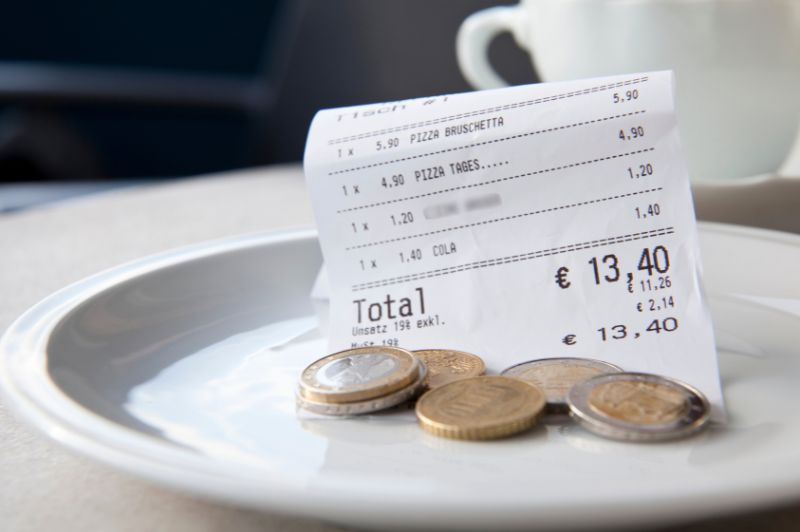Tipping in Paris: What Travelers Really Experience
If you’re planning a trip to Paris, you’ve probably heard that tipping isn’t part of French culture. Technically that’s true, but the reality on the ground is more complicated.
Travelers and locals alike are noticing a shift. Card machines now prompt for tips, servers sometimes press the issue, and tourist-heavy spots are where the problem shows up most. Here’s a clear look at what’s happening and how to handle it.
How Tipping Works in France
In France, restaurant bills already include service charges. By law, “service compris” is built into the price.
Staff are paid wages that come with benefits such as healthcare, retirement, and social protections. The system doesn’t rely on tips to make up income like in the U.S.
Traditionally, tipping is an optional gesture. People might leave a few coins, one or two euros if they appreciated the service. On a bigger bill, rounding up or leaving five euros is commonly done.
Leaving a percentage of the total (e.g. 15-20%) is an American custom that doesn’t normally exist in French dining culture.
New Reality in Paris Restaurants

Over the last few years, new card machines introduced options for adding a tip. Many terminals are programmed with buttons for 5%, 10%, or even 20%.
Some servers press “no tip” themselves when serving locals. Others hand the machine to tourists and wait for them to choose. In some cases, servers stand by silently, creating awkward pressure.
Travelers say that at certain restaurants, staff directly ask, “How much would you like to tip us?” In some places, if you say 5%, they scoff. This is especially common in busy tourist areas like the Marais, Champs-Élysées, Montmartre, and near the Eiffel Tower.
The falafel shop in the Marais L’As du Fallafel is an example that comes up often as a place where servers push for tips – while providing indifferent service.
How Locals React
Parisians are frustrated too. Many complain that this is a recent phenomenon driven by tourism and international events like the Olympics.
They find it infuriating to be pressured in their own city when tipping culture had largely disappeared decades ago.
Most locals simply say “Non, merci” and press the zero option. Some threaten to leave bad reviews for businesses that push tips aggressively.
Others insist on tipping only in cash so they know the money goes directly to the server rather than the owner.
What the Law Says About Service and Water
By law, tips cannot legally be demanded. Asking is tolerated, but requiring one is against the rules. If you’re pressured, you can remind staff that “le service est compris.”
Another common overcharging trick you may encounter in some restaurants is that they sometimes bring bottled mineral water without asking, then add it to the bill. Some even charge tourists for tap water.
French law requires restaurants to serve a free carafe of tap water with meals, and they must indicate this option clearly on the menu or with a visible sign.
Since 2022, this requirement has been reinforced under anti-waste rules. If a restaurant refuses, you have grounds to object. The correct phrase to use is “une carafe d’eau.”
Where It Happens Most
In restaurants that mainly serve locals, servers rarely bring up tips. In tourist-heavy areas, the chances are much higher.
Reports cluster around famous districts and eateries listed in guidebooks. Places with long lines of tourists are often the most aggressive.
This isn’t limited to Paris or even France. Travelers often report similar behavior in Italian tourist areas, and in some parts of Spain.
But Paris has seen a sharp rise in recent years as more restaurants adopt card machines with preset tip prompts.
How Tourists Feel
Some Americans feel guilty if they don’t tip because back home it’s considered rude. Others are relieved to finally break free of what they see as a manipulative system.
Some visitors tip 10% out of habit, which only reinforces servers’ expectations.
Those who speak French often find it easier to say no. Simply asking for tap water in French or using polite refusals reduces the pressure.
Tourists who only speak English, or who seem unsure, are more likely to be targeted.
Strategies That Work
Travelers who navigate Paris smoothly usually do a few things:
- They use cash when possible, leaving a coin or two only if service was genuinely good.
- They ask for “une carafe d’eau” and insist on it.
- They say “Non, merci” without hesitation when a tip prompt appears.
- If pressed, they point out “le service est compris.”
- They avoid restaurants with long tourist queues and instead look for places with more locals.
If things get really bad (rarely happens), you should point out that it’s illegal to demand tips, and report the incident to the French government’s fraud site: signal.conso.gouv.fr.
In Conclusion
This creeping shift toward American-style tipping is exactly what many French people fear. Once tourists normalize leaving percentages, restaurants will make it standard practice. Locals argue that giving in only accelerates the problem.
For travelers, the takeaway is clear: don’t feel obligated. Parisian servers are already paid wages that include benefits, and tipping is meant as a small personal gesture, not a hidden surcharge.
In France, the price you see on the menu is the price you pay.
